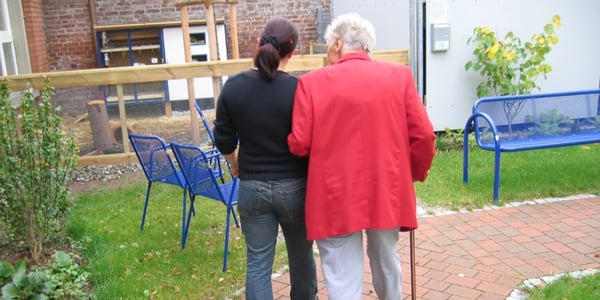Losing a loved one is one of the most challenging experiences anyone can face in life. It can be a...
Communicating with a Loved One with Dementia: 10 Tips
Dementia is an umbrella term commonly used to describe memory loss and other cognitive impairments often associated with aging. Dementia is not a specific disease: it is a term used to describe symptoms from several different pathologies. Common kinds of dementia include Alzheimer's, Lewy Body dementia, vascular dementia, frontotemporal dementia, and dementia caused by diseases such as Parkinson's. According to the National Institutes of Health (NIH), about 14% of people over the age of 71 will develop some form of dementia. This incidence climbs as people age: among those who live to 90, more than 37.4% show signs of dementia.
Signs of dementia can be subtle at first. One of the hallmark signs of this condition is short-term memory loss. You may find someone asking the same questions repeatedly or forgetting things that were just explained to or told to them. They may struggle to keep track of possessions like car keys, wallets, purses, and mobile devices. They might forget to go to appointments, fail to plan for meals, or begin roaming outside of their usual routine for no apparent reason.
Dementia also affects a person's ability to communicate. They might struggle with their vocabulary, finding it hard to describe things or repeatedly relying on the same set of words. Instead of using the proper name, they might describe something. For example, a person with dementia might call a coffee maker "the thing that makes that stuff, the good-smelling brown one." They may also become withdrawn as the frustration of being unable to communicate well sets in. These problems may worsen as the disease progresses.
Communicating With a Loved One With Dementia
First and foremost, it is essential that you remember that your loved one is still your loved one. Cognitive decline can be startling and difficult to cope with, especially when someone you know and love begins to change. But it's critical not to pull away or avoid them. They are still the person you love, and they still value your relationship and your company, even if they're not able to express it to you. Being present for a loved one who has dementia is incredibly meaningful and important to them: it communicates that you still care.
But what about verbal communication? How can we effectively communicate with someone suffering from dementia? Experts recommend several strategies.
-
Include them in Conversations
People who have dementia can still participate in conversations. Infantilizing them, talking over them, or talking on their behalf can be hurtful. Even if they have a hard time communicating or keeping up, it's important to speak to them, engage with them, and include them. They are still human beings!
-
Don't Assume
 It's easy to assume that because someone has dementia, they can no longer communicate. Dementia affects people in different ways. Especially in the early stages of the disease, it's entirely possible for someone with dementia to communicate verbally and express themselves. Assuming that they are now incapable of communication is a mistake.
It's easy to assume that because someone has dementia, they can no longer communicate. Dementia affects people in different ways. Especially in the early stages of the disease, it's entirely possible for someone with dementia to communicate verbally and express themselves. Assuming that they are now incapable of communication is a mistake. -
Keep it Simple
Dementia can affect verbal processing and vocabulary. It's important to keep your communication simple. If you need to ask a question, phrase it so it can be answered with a simple "yes" or "no." If you need to help them with a task, avoid task-saturating them by breaking it down into specific individual steps.
-
Offer Choices
Your loved one with dementia might be reluctant to perform some tasks. For example, bathing, cleaning up, or performing other activities might suddenly seem overwhelming, or they may simply wish to avoid doing them. To effectively help them accomplish these tasks, offer them choices. For example, you could ask, "Would you like to brush your teeth before we watch TV or after we watch TV?"
-
Use Visual Cues
As dementia progresses, your loved one may struggle to understand words. Pairing the words with visual cues can help promote understanding. For example, if you need to get them to brush their teeth, pairing their toothbrush with a simple phrase like "It's time to brush our teeth" will help them understand what is happening. The visual cue can send information down different pathways than an audible message, making it more likely to understand the message.
-
Avoid Distractions
Even when we have complete control of our cognitive faculties, background noises can be distracting. TV shows, radios, music, and other visual or audible distractions can make it challenging to communicate. Limit distractions to minimize difficulties with hearing and concentration.
-
Listen to Them
 While they might have a hard time expressing themselves, people with dementia still have valuable things to say and emotions to express. Take the time to listen to them. Use active listening techniques and be patient. They likely have a lot of feelings, thoughts, and ideas that they want to express to you. Pay attention and engage with them.
While they might have a hard time expressing themselves, people with dementia still have valuable things to say and emotions to express. Take the time to listen to them. Use active listening techniques and be patient. They likely have a lot of feelings, thoughts, and ideas that they want to express to you. Pay attention and engage with them. -
Avoid Arguing
Sometimes, people with dementia might lose impulse control or a sense of social appropriateness. It's important to avoid arguing with them, correcting them, or criticizing them. Arguing and responding to correction or criticism requires cognitive bandwidth that they may no longer have access to. Redirect them, ignore the comment, or simply move along, but avoid getting into an argument with someone who has dementia.
-
Take Breaks
As much as we love them, it can be challenging to deal with someone who has dementia. If you feel your temper rising or feel yourself beginning to become frustrated or angry, it's important to take a break. This can be as simple as leaving the room for a few minutes, taking a brisk walk, or taking a few deep breaths and counting to ten. It's important not to lose your temper or become combative with your loved one experiencing dementia.
-
Keep Your Sense of Humor!
Laughing with your loved one who has dementia is a great way to bond. Dementia is frustrating for the person who has it and also for their families and friends. Joking together, watching a humorous movie or a comedy show, or otherwise finding a way to get laughs in is a great way to release endorphins, improve your moods, and bond together. Dementia is a severe health problem, but finding a way to laugh about it together will help you both cope. Humor may not be the best medicine for everything, but it sure does help!
Let us know in the comments below - What has your experience been like communicating with someone with dementia?
Want more content like this? Click here to subscribe to our blog.
Related Content:






